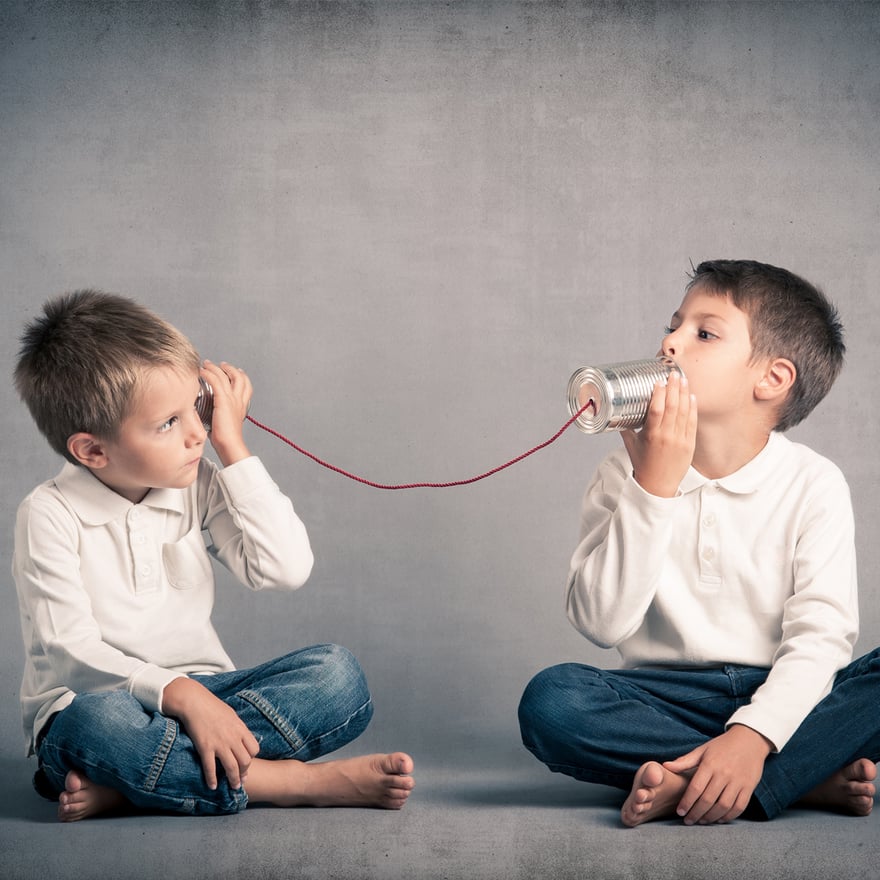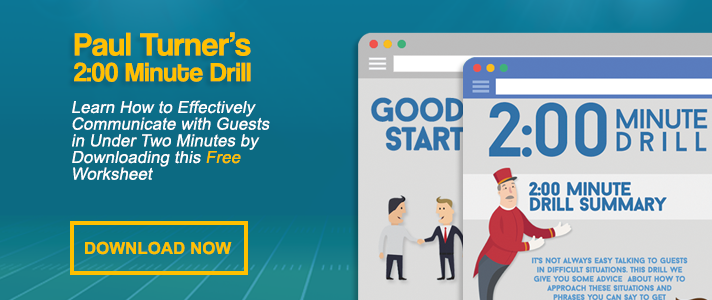Do you invest a lot of time teaching your veteran or part time staff how to communicate effectively with guests?
With so many events each year – football, concerts, motorsports and corporate events – and constant turnover, you’re challenged with ensuring that front line staff properly interacts with guests.
We get it:
If they underperform it affects every area of your operation…ultimately affecting the whole organization.
How do you solve this guest services puzzle?
You have workers from all walks of life, with different skill sets and training experiences. Some are more seasoned than others, others have been exposed to more training and development, and some are brand new.
How do you empower your staff to effectively engage with your guests?
We know the answer and can’t wait to share it with you.
Today’s article is going to provide you with the framework of several useful techniques for communicating with your guests and delivering an exceptional guest experience at every touchpoint on game day.
It gets even better:
We have a great offer for you at the bottom of this article.
Paul Turner, award-winning director of event operations and security for AT&T Stadium and the Dallas Cowboys provided us with his “Two Minute Drill” for communicating effectively with guests.
All we ask is that you sign up for the blog so we can send you valuable information like this in the future.
Deal?
Paul’s training materials that he was so kind to share with us, coupled with his original IAVM Stadiums Blog post were inspiration for today’s article. We thank him profusely for this information. (You might see some insights sprinkled in here and there from his original post.)
You’ve got tons of information ahead of you. Let’s not waste any more time.
Are you ready? Let’s dive in.
Oh, and never forget…in the end it’s all about your guests’ experience. From safety to security…every impression, every interaction – they all count!
“I tell my management team and our part time staff that the real purpose of my job is to help them be excellent in their jobs. Everything that we do as a management team is ultimately focused on ensuring that our front line staff and their supervisors are put in a position to be successful. After all, the event day personnel are the ones that are face-to-face with our customers, our season ticket holders, our sponsors’ constituents. If they fail to execute, then the entire enterprise is a failure.” – Paul Turner
Communicate Effectively with Guests Using…GUEST.
Have high expectations and empower your team to deliver the best GUEST services experience, for every point of contact on game day.
That means before, during and after the game.
Greet sincerely with eye contact
Understand the guest’s needs
Engage yourself in helping guests promptly
Smile and be positive throughout
Thank guests at every opportunity
8 Ways to Win the Day
It’s time to really wow your crowd!
We’ve labeled 8 vital touch points for game day guest services. You can immediately begin to teach your staff how to communicate effectively with guests using these strategies.
We’re going to show you how.
Put these strategies in place and enjoy the peace of mind that follows.
1. Guest Arrival/Parking Lot Operations
- Communicate effectively with guests through your radio partners (e.g. local radio stations) to deliver traffic routes and patterns allowing for a more enjoyable commute. Give fans parking lot updates (e.g. when lots are full or whether lot closures take place). We recommend notifying fans when lots are about two-thirds full.
- Use signage in the parking lot to display your text communication information so that your guests can use it when they need to.
- Have your season ticket holders’ opt-in to receive game day notifications and send group notifications via a text communication solution to these subscribers to communicate weather updates, traffic patterns and parking lot information.
- Deploy alcohol management teams to identify and mitigate potential hazards as a result of intoxicated persons. This also provides assurance to fans that guest services is under control, and is dedicated to their experience and safety. 30 minutes prior to game start, move your alcohol management and rapid response teams to entry gates. This will allow them to monitor and identify intoxicated persons and mitigate any incidents before they occur.
2. Stadium Access
- Run the math and use your analytics to employ appropriate staffing in order to cut line times to between approximately two and three minutes.
(Pro tip: Benefit of shorter lines: Not only does increased flow of lines enhance the guest experience but it also mitigates the risk for an active shooter incident. With active shooter incidents on the rise, it’s important to alleviate the possibility of scenarios where large crowds are bottlenecked. Increasing flow of traffic greatly reduces the opportunity for active shooters to take advantage of large, crowded settings.)
3. Guest Movement
- Role-play with your staff using the GUEST acronym we provide above and put it into place in order to prevent any guest services nightmare.
- Empower staff to acknowledge all fans they make eye contact with. This lets the guest know your team is there for them. It gives them the peace of mind you’re in control and ready to provide them with a safe and secure environment for that memorable experience they came to your facility for.
- By doing all of this, you’re demonstrating the fact you hire and train staff that wants to help fans and are there when they need them.
4. Stadium Concourses
- Mount signage displaying fan code of conduct and text communication information throughout your concourses and every concession point. This makes the fan code of conduct clear to fans – it makes it real.
- No one likes it when they lose something and the time it can take to report a lost item can feel like salt in a wound. Implement a lost and found solution letting your guests report their lost items directly at your guest services locations. This is an inexpensive way to enhance guest experience and build guest loyalty.
- Signage displayed in the concourses also act as a deterrent for intoxicated persons. If they’re not in the right state of mind, clear signage might help put them back in line.
- Use your analytics to understand point of sale metrics to best determine your staffing needs against the fan base for specific areas in the stadium.
(Pro tip: Fan demographics change according to the size and type of event. That being said, so will your staffing needs.)
5. Stadium Bowl Entry
- All ushers need to be at their post and ready to WOW your fans. It’s game time!
- It’s important to have all ushers trained on hotspots and protocols.
- Train staff on how to effectively communicate incidents to the command post.
- Always mount signage that displays your fan code of conduct and text communication information – make it prominent upon entry into the stadium bowl.
6. The Stadium Bowl
- Communicate to your fans on a large scale! Deliver light-hearted public service announcements (PSA) at specific times during the game explaining your fan code of conduct and ways to communicate with staff in the event of an incident.
Here’s an example: During a football game, an effective time would be during the first timeout of the first quarter and right before the second half begins. This will ensure the largest audience for the announcements.
- Prominently display visible static signage throughout the bowl inclusive of fan code of conduct and text communication information. That way, when you’re not on the loud speaker everyone knows you’re still in control and focused on their safety at all times.
- Being able to exceed fan expectations is a key ingredient to a successful game day. Implement a guest request tracker to increase staff efficiency and enhance performance. Never overlook a wheelchair request again.
7. Stadium Exit
- Re-deploy your rapid response team to the parking lot anywhere from 10 minutes before the end of game to the end of game, depending on activity in the bowl.
- Re-deploy your police force to the parking lot complete with patrol cars and lights flashing, along with officers on foot. This is a useful deterrent for potential hazards. It also provides assurance to your fans they will experience a safe and smooth exit from the stadium property.
- Oh and by the way, let your fans report lost items to the lost and found manager through your website if they missed guest services in the concourses.
8. Parking Departure
- The party’s over, but that doesn’t mean guest services stop! Your ushers should be waving good-bye and thanking your guests for attending the event.
- Use variable message (VM) boards with thank you messages to supplement your staff’s sendoff.
- Depending on the location of your stadium, re-route traffic patterns for easy exit too. It’s one more shot to WOW your guests on game day.
Over to You
Finish your guest service efforts by leaving a smile on everyone’s face. Do this and your guests will always come back for the great experience!
Always hold your staff accountable to achieve all eight ways to win the day and to communicate effectively with guests.
Measure their performance on game day and ensure they deliver service with professionalism, enthusiasm and the friendliness you require for a memorable experience.
As Paul says, staff members “come to us with a variety of backgrounds and a spectrum of skills. And from this vast diversity, we seek to get uniform, high quality results.”
Now ask yourself…Are you getting uniform, high quality results…and peace of mind?
So, will you be employing the eight ways to win the day at your stadium this season?
Don’t forget to download Paul Turner’s 2:00 Minute Drill for communicating effectively with guests by clicking the image below.




